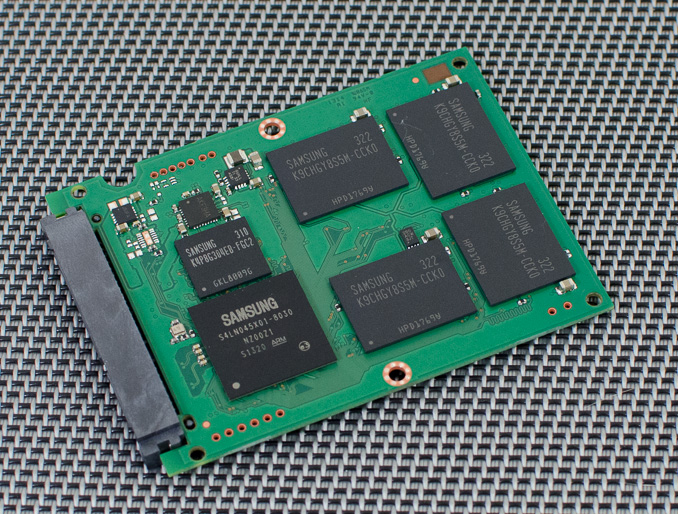Samsung SSD 840 EVO Review: 120GB, 250GB, 500GB, 750GB & 1TB Models Tested
by Anand Lal Shimpi on July 25, 2013 1:53 PM EST- Posted in
- Storage
- SSDs
- Samsung
- TLC
- Samsung SSD 840
Final Words
I was extremely excited about Crucial's M500 because it was the first reasonably priced ~1TB SSD. Even though its performance wasn't class leading, it was honestly good enough to make the recommendation a no-brainer. The inclusion of features like eDrive support were just the icing on the cake. With the EVO, Samsung puts forth a formidable competitor to the M500. It's faster, uses less power at idle and carries lower MSRPs for most of the capacity range. Microsoft's eDrive standard isn't supported at launch, but Samsung expects to change that via a firmware update this September.
Endurance isn't a concern with TLC for client workloads, although I wouldn't recommend deploying the EVO in a write heavy database server or anything like that.
The additional features that Samsung threw in the pot this round really show some innovative thinking. TurboWrite does a good job of blurring the lines between MLC and TLC performance, while Samsung's RAPID DRAM cache offers adventurous users a way of getting a taste of high-end PCIe SSD performance out of an affordable TLC SATA drive.
The 1TB version is exciting because it offers a competitive price with the 960GB M500 but with better performance. It's also good to have an alternative there as the 960GB M500 has been supply constrained at times. At first I didn't believe that Samsung's TLC strategy could hold weight against the Intel/Micron approach of aggressively pursuing smaller process nodes with MLC NAND, but the EVO does a lot to change my opinion. I'd have no issues with one of these drives in my system even as primary storage. The performance story is really good (particularly with the larger capacities), performance consistency out of the box is ok (and gets better if you can leave more free space on the drive) and you've got Samsung's firmware expertise supporting you along the way as well.

To say that I really like the EVO is an understatement. If Samsung can keep quantities of the 840 EVO flowing, and keep prices at or below its MSRP, it'll be a real winner and probably my pick for best mainstream SSD.











137 Comments
View All Comments
MrCommunistGen - Thursday, July 25, 2013 - link
YES! I've been excitedly waiting for this review since the announcement!Byte - Thursday, July 25, 2013 - link
Writes for the 120GB are still quite slow.chizow - Thursday, July 25, 2013 - link
That's nearly universal though for all the entry-level capacity SSDs on the market, it's similar to RAID 0, when you can write to symmetrical NAND packages you see a significant increase in write speeds.OUT FOX EM - Monday, July 29, 2013 - link
Speaking of RAID 0, if you'll notice, all the drives of 250GB and higher perform around the same. You are MUCH better off getting 4x250GB drives instead of the 1TB. With most models the cost will actually be about the same, but the speed of the RAID will be 4x faster as well while maintaining the same capacity.Of course there are other drawbacks like space inside your PC and amount of available SATA ports on your motherboard, for instance, but if those aren't a factor, buying multiple SSD's is a much better option in terms of performance. I don't see many reviews mention this fact.
Jorgisven - Thursday, August 1, 2013 - link
Much better in terms of performance, but I wouldn't recommend RAID 0 for 4 SSD hard drives. RAID6 is likely a better option, as it is fault tolerant without losing too much space. It's a bit of a personal decision, but the RAID concepts stand true whether it's SSD or not. Additionally, 4x250 is likely a good percentage more expensive than the already expensive 1TB SSD.Democrab - Thursday, August 15, 2013 - link
I'm not sure about you, but I'm only storing replaceable data on my SSDs...There are game saves but they're automatically put on Google Drive too so I get backups easily, it's easy to set something like that up and then just get the benefits of RAID0 although I'd be using a RAID card as the chipset would likely bottleneck it.yut345 - Thursday, December 12, 2013 - link
I agree. Due to the volatile nature of SSDs, and the fact that if they go down your data can't really be recovered like it could be on mechanical drive, I do not plan to store anything on the drive that I don't also back up somewhere else.m00dawg - Friday, August 23, 2013 - link
With only 4 drives, a RAID10 would be much preferable. 1/2 the available space (same as a 4 drive RAID6 in this case), but without the need to calculate parity, worry (as much) about partitioning alignment, and you can still handle up to 2 drive failures (though only if they are on different stripes).fallaha56 - Friday, September 19, 2014 - link
sorry but disagree this will defeat the point unless you're on a top-end raid controller -and then you get no TRIMwhen there's no moving parts reliability becomes much less of an issue, esp for an OS drive with cloud and local backup like most of us high-end users do
Stas - Tuesday, September 24, 2013 - link
That's what I did for the recent laser data processing builds. 4x250GB 840s and a 1TB HDD for nightly backup. Only data is stored on the array. Speeds are up to 1600MB/sec. Needless to say, the client is very happy :)